Reflective Learning Essay: Formative Feedback and Business Culture
VerifiedAdded on 2023/06/18
|9
|2491
|263
Essay
AI Summary
This essay provides an overview of reflective learning, emphasizing Kolb's reflective model and its application in business management education. It discusses the importance of formative feedback in improving summative assessment outcomes, highlighting how feedback helps students identify strengths and weaknesses. The essay also explores the cultural and behavioral expectations of business management students, focusing on professionalism, critical thinking, and social responsibility. Furthermore, it emphasizes the significance of peer-to-peer support and teamwork in enhancing learning experiences, fostering communication skills, and preparing students for future success. The essay concludes that reflective learning, combined with effective feedback mechanisms and collaborative learning approaches, is crucial for developing well-rounded and capable business professionals. Desklib offers a wealth of resources for students seeking further assistance with their assignments.
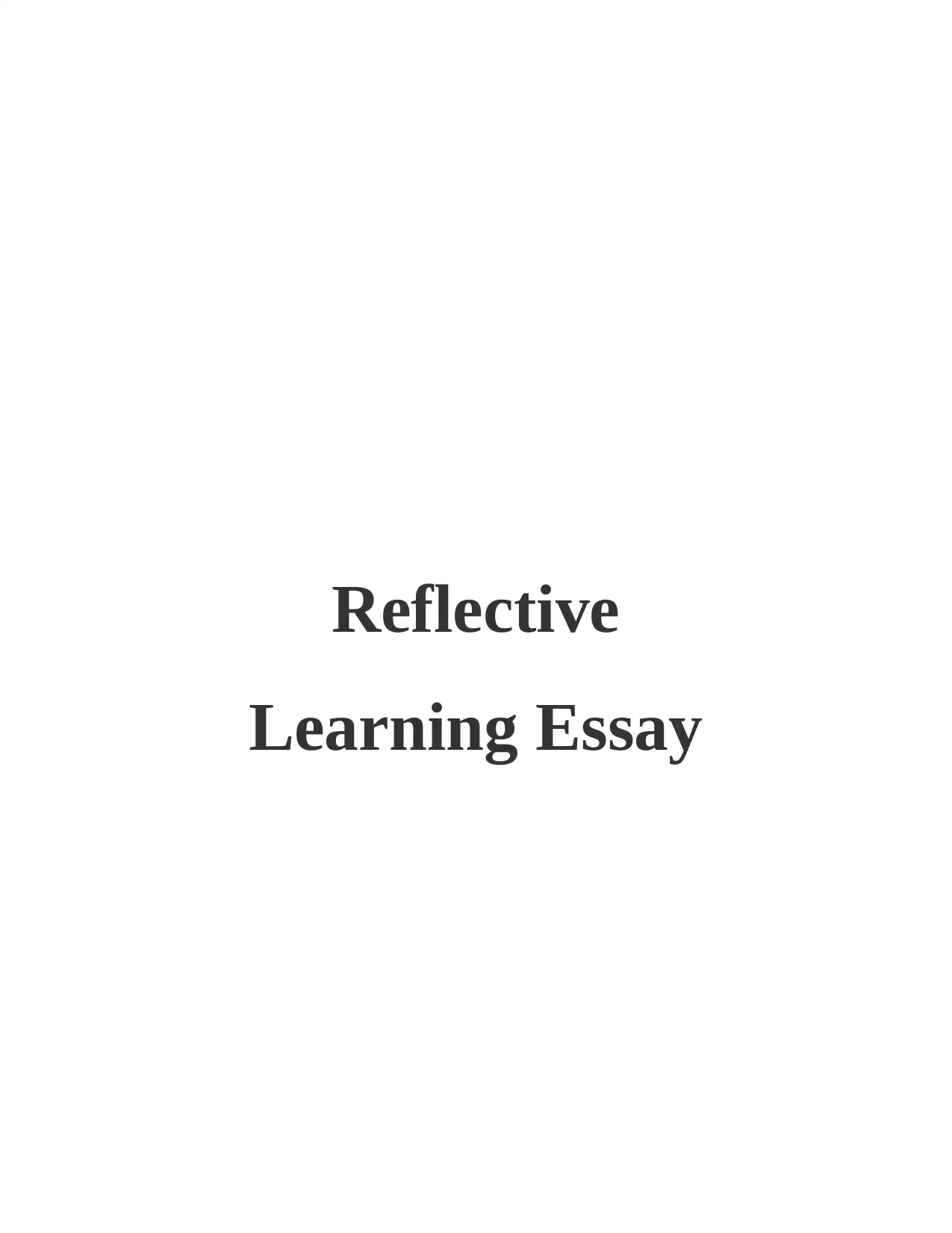
Reflective
Learning Essay
Learning Essay
Paraphrase This Document
Need a fresh take? Get an instant paraphrase of this document with our AI Paraphraser
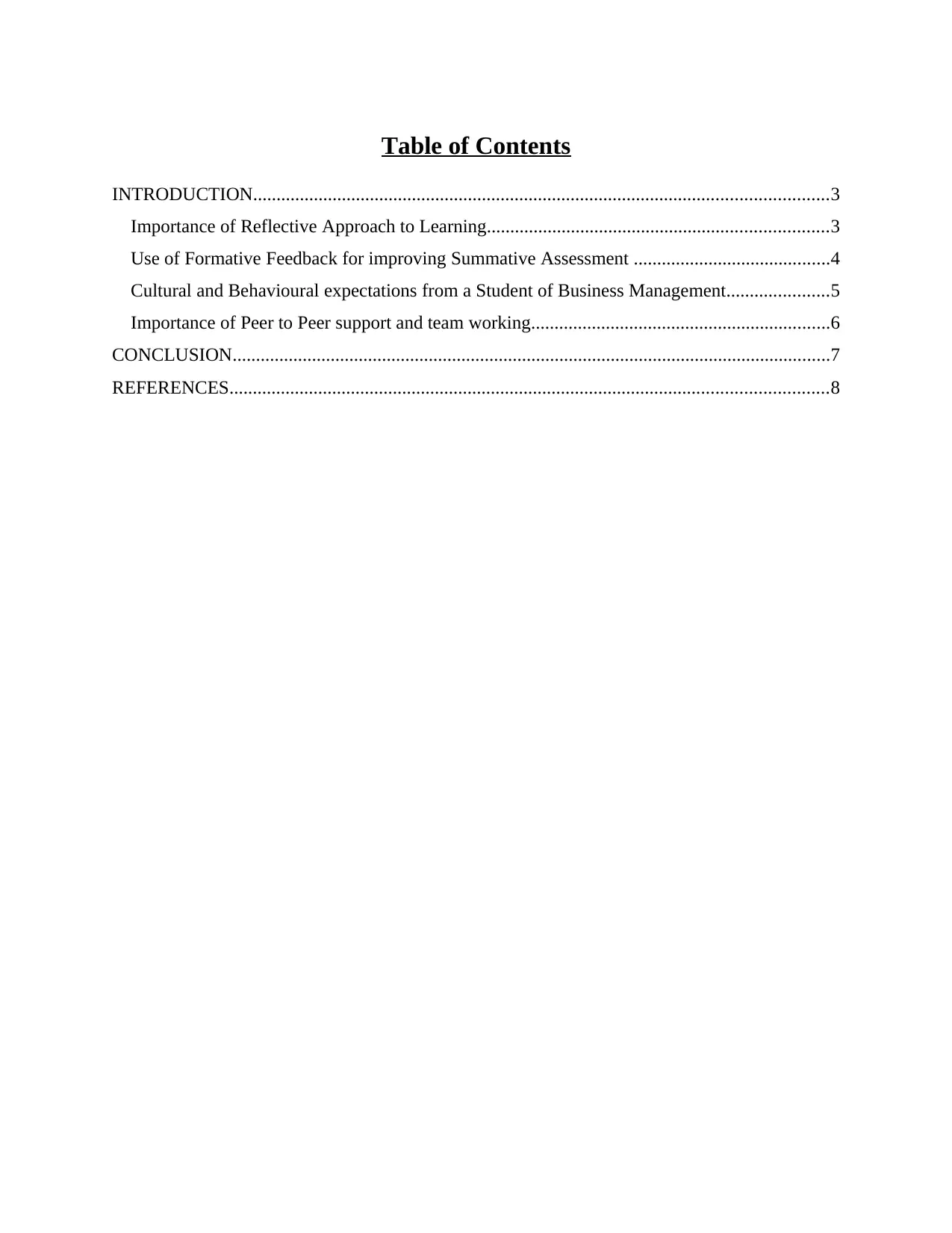
Table of Contents
INTRODUCTION...........................................................................................................................3
Importance of Reflective Approach to Learning.........................................................................3
Use of Formative Feedback for improving Summative Assessment ..........................................4
Cultural and Behavioural expectations from a Student of Business Management......................5
Importance of Peer to Peer support and team working................................................................6
CONCLUSION................................................................................................................................7
REFERENCES................................................................................................................................8
INTRODUCTION...........................................................................................................................3
Importance of Reflective Approach to Learning.........................................................................3
Use of Formative Feedback for improving Summative Assessment ..........................................4
Cultural and Behavioural expectations from a Student of Business Management......................5
Importance of Peer to Peer support and team working................................................................6
CONCLUSION................................................................................................................................7
REFERENCES................................................................................................................................8
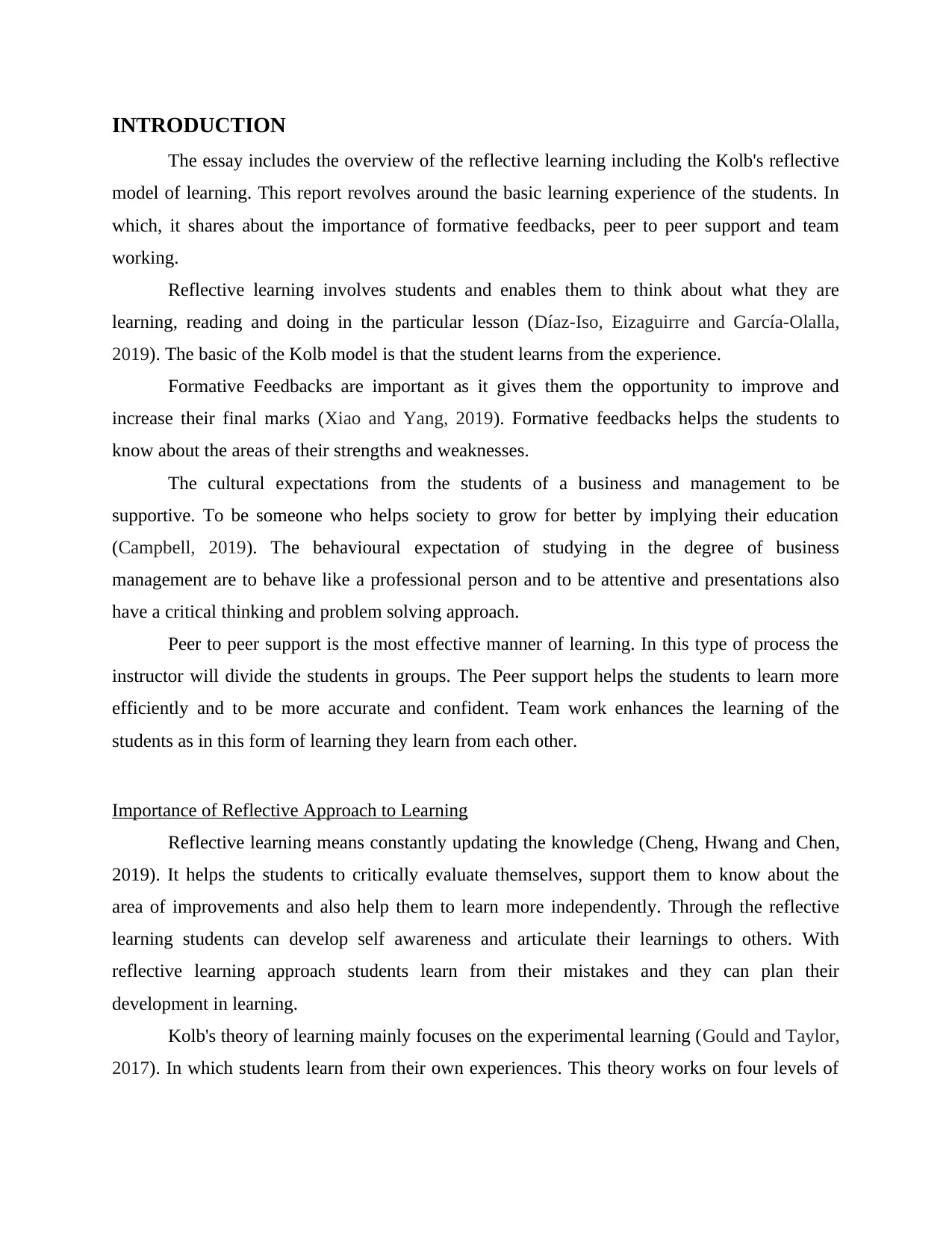
INTRODUCTION
The essay includes the overview of the reflective learning including the Kolb's reflective
model of learning. This report revolves around the basic learning experience of the students. In
which, it shares about the importance of formative feedbacks, peer to peer support and team
working.
Reflective learning involves students and enables them to think about what they are
learning, reading and doing in the particular lesson (Díaz-Iso, Eizaguirre and García-Olalla,
2019). The basic of the Kolb model is that the student learns from the experience.
Formative Feedbacks are important as it gives them the opportunity to improve and
increase their final marks (Xiao and Yang, 2019). Formative feedbacks helps the students to
know about the areas of their strengths and weaknesses.
The cultural expectations from the students of a business and management to be
supportive. To be someone who helps society to grow for better by implying their education
(Campbell, 2019). The behavioural expectation of studying in the degree of business
management are to behave like a professional person and to be attentive and presentations also
have a critical thinking and problem solving approach.
Peer to peer support is the most effective manner of learning. In this type of process the
instructor will divide the students in groups. The Peer support helps the students to learn more
efficiently and to be more accurate and confident. Team work enhances the learning of the
students as in this form of learning they learn from each other.
Importance of Reflective Approach to Learning
Reflective learning means constantly updating the knowledge (Cheng, Hwang and Chen,
2019). It helps the students to critically evaluate themselves, support them to know about the
area of improvements and also help them to learn more independently. Through the reflective
learning students can develop self awareness and articulate their learnings to others. With
reflective learning approach students learn from their mistakes and they can plan their
development in learning.
Kolb's theory of learning mainly focuses on the experimental learning (Gould and Taylor,
2017). In which students learn from their own experiences. This theory works on four levels of
The essay includes the overview of the reflective learning including the Kolb's reflective
model of learning. This report revolves around the basic learning experience of the students. In
which, it shares about the importance of formative feedbacks, peer to peer support and team
working.
Reflective learning involves students and enables them to think about what they are
learning, reading and doing in the particular lesson (Díaz-Iso, Eizaguirre and García-Olalla,
2019). The basic of the Kolb model is that the student learns from the experience.
Formative Feedbacks are important as it gives them the opportunity to improve and
increase their final marks (Xiao and Yang, 2019). Formative feedbacks helps the students to
know about the areas of their strengths and weaknesses.
The cultural expectations from the students of a business and management to be
supportive. To be someone who helps society to grow for better by implying their education
(Campbell, 2019). The behavioural expectation of studying in the degree of business
management are to behave like a professional person and to be attentive and presentations also
have a critical thinking and problem solving approach.
Peer to peer support is the most effective manner of learning. In this type of process the
instructor will divide the students in groups. The Peer support helps the students to learn more
efficiently and to be more accurate and confident. Team work enhances the learning of the
students as in this form of learning they learn from each other.
Importance of Reflective Approach to Learning
Reflective learning means constantly updating the knowledge (Cheng, Hwang and Chen,
2019). It helps the students to critically evaluate themselves, support them to know about the
area of improvements and also help them to learn more independently. Through the reflective
learning students can develop self awareness and articulate their learnings to others. With
reflective learning approach students learn from their mistakes and they can plan their
development in learning.
Kolb's theory of learning mainly focuses on the experimental learning (Gould and Taylor,
2017). In which students learn from their own experiences. This theory works on four levels of
⊘ This is a preview!⊘
Do you want full access?
Subscribe today to unlock all pages.

Trusted by 1+ million students worldwide
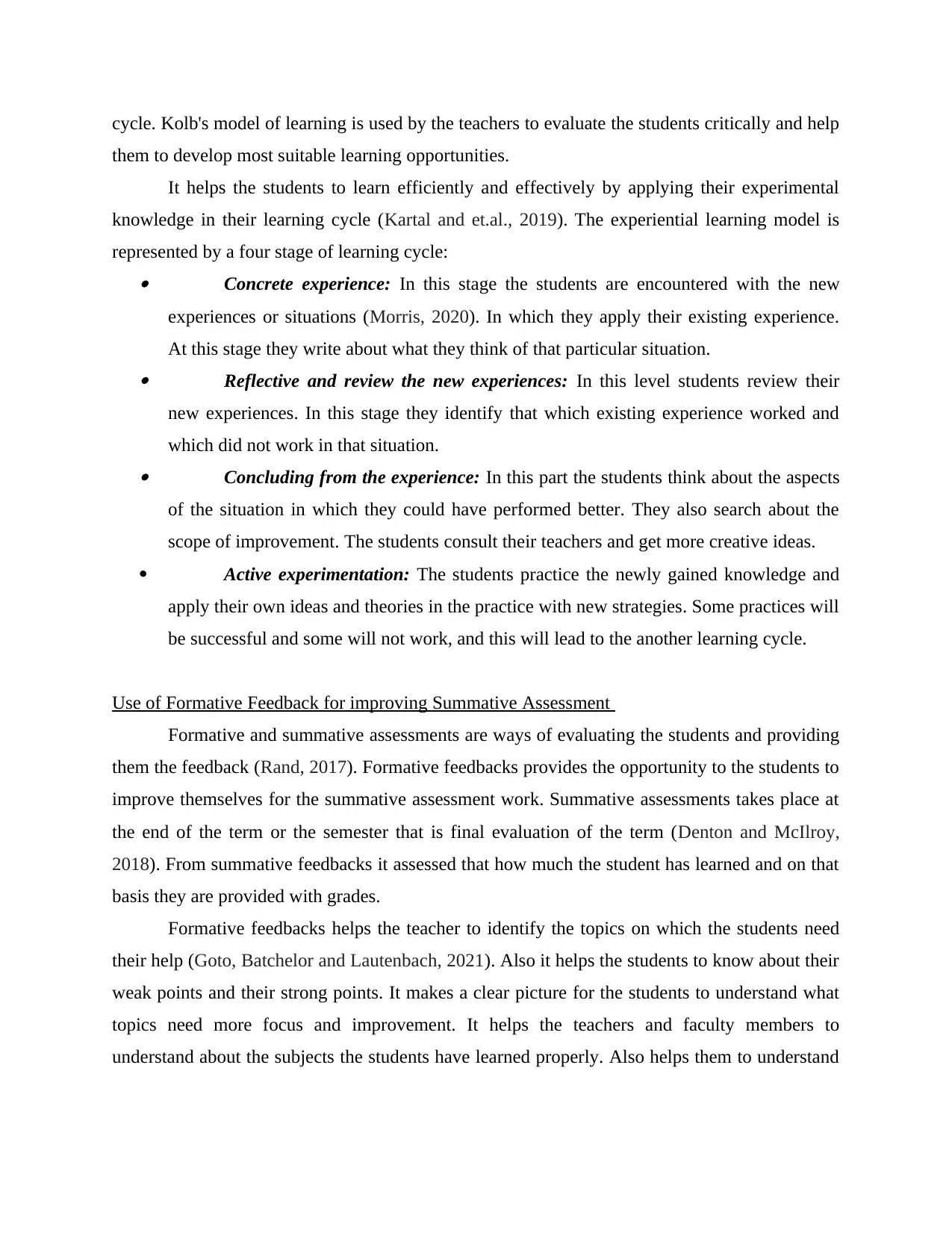
cycle. Kolb's model of learning is used by the teachers to evaluate the students critically and help
them to develop most suitable learning opportunities.
It helps the students to learn efficiently and effectively by applying their experimental
knowledge in their learning cycle (Kartal and et.al., 2019). The experiential learning model is
represented by a four stage of learning cycle: Concrete experience: In this stage the students are encountered with the new
experiences or situations (Morris, 2020). In which they apply their existing experience.
At this stage they write about what they think of that particular situation. Reflective and review the new experiences: In this level students review their
new experiences. In this stage they identify that which existing experience worked and
which did not work in that situation. Concluding from the experience: In this part the students think about the aspects
of the situation in which they could have performed better. They also search about the
scope of improvement. The students consult their teachers and get more creative ideas.
Active experimentation: The students practice the newly gained knowledge and
apply their own ideas and theories in the practice with new strategies. Some practices will
be successful and some will not work, and this will lead to the another learning cycle.
Use of Formative Feedback for improving Summative Assessment
Formative and summative assessments are ways of evaluating the students and providing
them the feedback (Rand, 2017). Formative feedbacks provides the opportunity to the students to
improve themselves for the summative assessment work. Summative assessments takes place at
the end of the term or the semester that is final evaluation of the term (Denton and McIlroy,
2018). From summative feedbacks it assessed that how much the student has learned and on that
basis they are provided with grades.
Formative feedbacks helps the teacher to identify the topics on which the students need
their help (Goto, Batchelor and Lautenbach, 2021). Also it helps the students to know about their
weak points and their strong points. It makes a clear picture for the students to understand what
topics need more focus and improvement. It helps the teachers and faculty members to
understand about the subjects the students have learned properly. Also helps them to understand
them to develop most suitable learning opportunities.
It helps the students to learn efficiently and effectively by applying their experimental
knowledge in their learning cycle (Kartal and et.al., 2019). The experiential learning model is
represented by a four stage of learning cycle: Concrete experience: In this stage the students are encountered with the new
experiences or situations (Morris, 2020). In which they apply their existing experience.
At this stage they write about what they think of that particular situation. Reflective and review the new experiences: In this level students review their
new experiences. In this stage they identify that which existing experience worked and
which did not work in that situation. Concluding from the experience: In this part the students think about the aspects
of the situation in which they could have performed better. They also search about the
scope of improvement. The students consult their teachers and get more creative ideas.
Active experimentation: The students practice the newly gained knowledge and
apply their own ideas and theories in the practice with new strategies. Some practices will
be successful and some will not work, and this will lead to the another learning cycle.
Use of Formative Feedback for improving Summative Assessment
Formative and summative assessments are ways of evaluating the students and providing
them the feedback (Rand, 2017). Formative feedbacks provides the opportunity to the students to
improve themselves for the summative assessment work. Summative assessments takes place at
the end of the term or the semester that is final evaluation of the term (Denton and McIlroy,
2018). From summative feedbacks it assessed that how much the student has learned and on that
basis they are provided with grades.
Formative feedbacks helps the teacher to identify the topics on which the students need
their help (Goto, Batchelor and Lautenbach, 2021). Also it helps the students to know about their
weak points and their strong points. It makes a clear picture for the students to understand what
topics need more focus and improvement. It helps the teachers and faculty members to
understand about the subjects the students have learned properly. Also helps them to understand
Paraphrase This Document
Need a fresh take? Get an instant paraphrase of this document with our AI Paraphraser
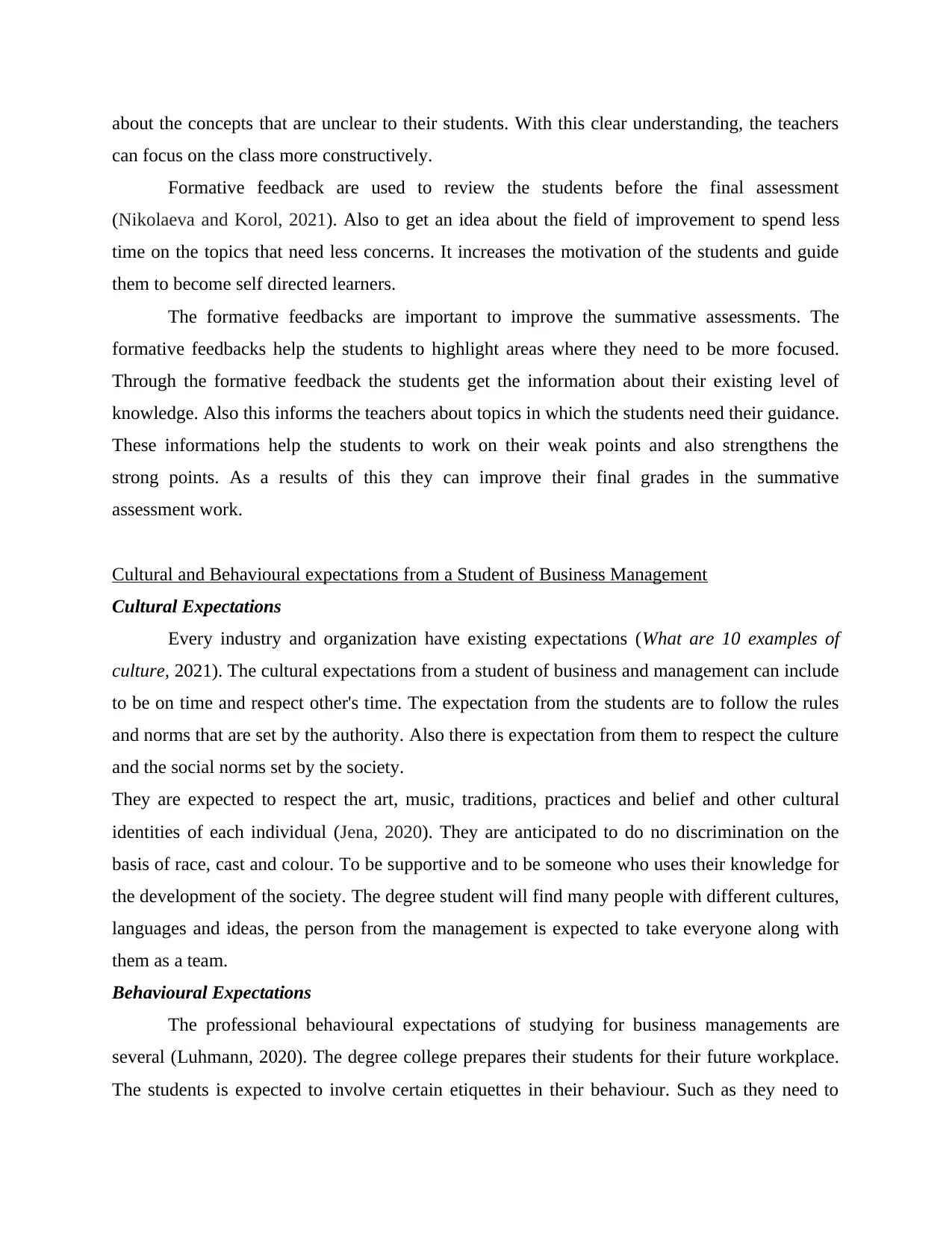
about the concepts that are unclear to their students. With this clear understanding, the teachers
can focus on the class more constructively.
Formative feedback are used to review the students before the final assessment
(Nikolaeva and Korol, 2021). Also to get an idea about the field of improvement to spend less
time on the topics that need less concerns. It increases the motivation of the students and guide
them to become self directed learners.
The formative feedbacks are important to improve the summative assessments. The
formative feedbacks help the students to highlight areas where they need to be more focused.
Through the formative feedback the students get the information about their existing level of
knowledge. Also this informs the teachers about topics in which the students need their guidance.
These informations help the students to work on their weak points and also strengthens the
strong points. As a results of this they can improve their final grades in the summative
assessment work.
Cultural and Behavioural expectations from a Student of Business Management
Cultural Expectations
Every industry and organization have existing expectations (What are 10 examples of
culture, 2021). The cultural expectations from a student of business and management can include
to be on time and respect other's time. The expectation from the students are to follow the rules
and norms that are set by the authority. Also there is expectation from them to respect the culture
and the social norms set by the society.
They are expected to respect the art, music, traditions, practices and belief and other cultural
identities of each individual (Jena, 2020). They are anticipated to do no discrimination on the
basis of race, cast and colour. To be supportive and to be someone who uses their knowledge for
the development of the society. The degree student will find many people with different cultures,
languages and ideas, the person from the management is expected to take everyone along with
them as a team.
Behavioural Expectations
The professional behavioural expectations of studying for business managements are
several (Luhmann, 2020). The degree college prepares their students for their future workplace.
The students is expected to involve certain etiquettes in their behaviour. Such as they need to
can focus on the class more constructively.
Formative feedback are used to review the students before the final assessment
(Nikolaeva and Korol, 2021). Also to get an idea about the field of improvement to spend less
time on the topics that need less concerns. It increases the motivation of the students and guide
them to become self directed learners.
The formative feedbacks are important to improve the summative assessments. The
formative feedbacks help the students to highlight areas where they need to be more focused.
Through the formative feedback the students get the information about their existing level of
knowledge. Also this informs the teachers about topics in which the students need their guidance.
These informations help the students to work on their weak points and also strengthens the
strong points. As a results of this they can improve their final grades in the summative
assessment work.
Cultural and Behavioural expectations from a Student of Business Management
Cultural Expectations
Every industry and organization have existing expectations (What are 10 examples of
culture, 2021). The cultural expectations from a student of business and management can include
to be on time and respect other's time. The expectation from the students are to follow the rules
and norms that are set by the authority. Also there is expectation from them to respect the culture
and the social norms set by the society.
They are expected to respect the art, music, traditions, practices and belief and other cultural
identities of each individual (Jena, 2020). They are anticipated to do no discrimination on the
basis of race, cast and colour. To be supportive and to be someone who uses their knowledge for
the development of the society. The degree student will find many people with different cultures,
languages and ideas, the person from the management is expected to take everyone along with
them as a team.
Behavioural Expectations
The professional behavioural expectations of studying for business managements are
several (Luhmann, 2020). The degree college prepares their students for their future workplace.
The students is expected to involve certain etiquettes in their behaviour. Such as they need to
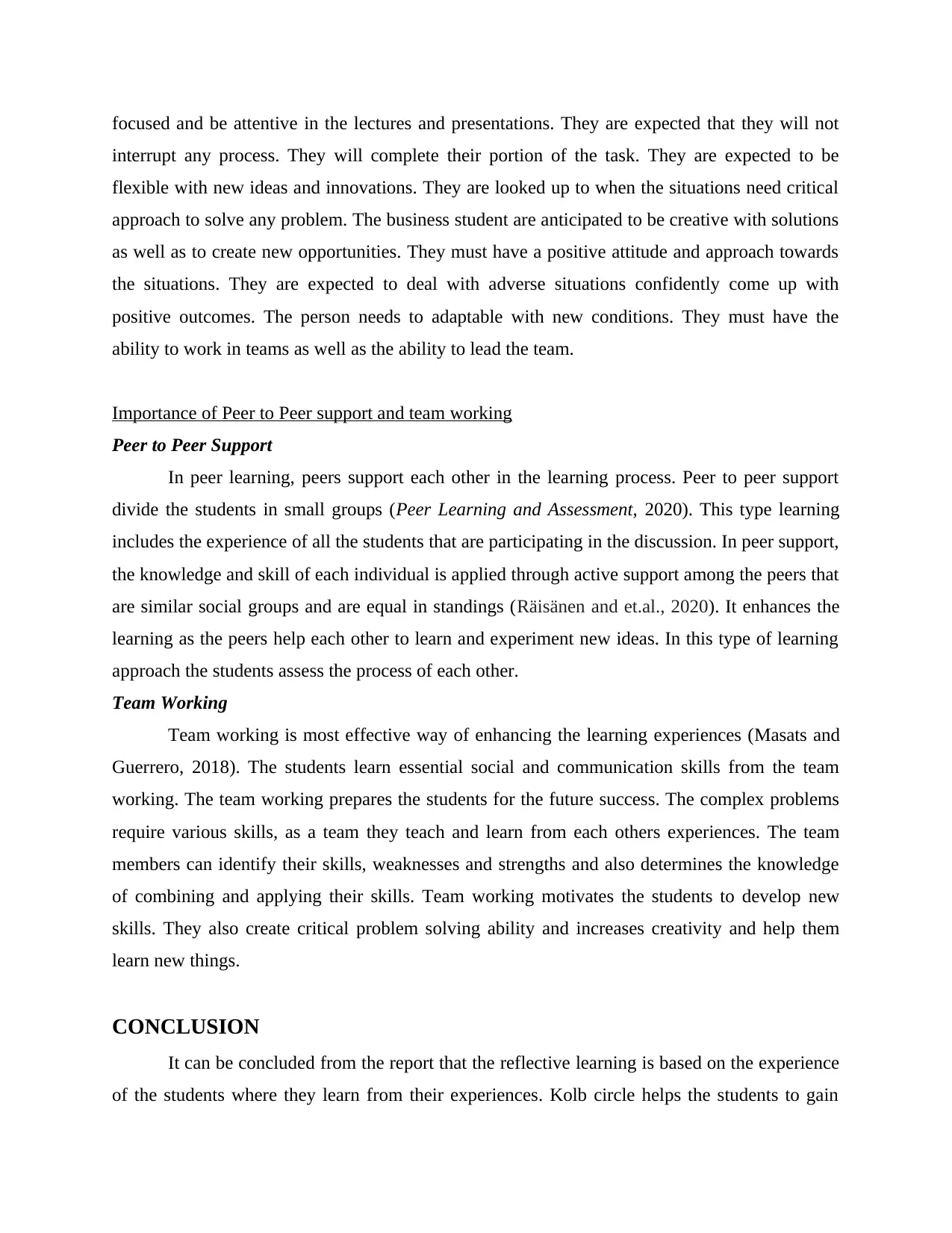
focused and be attentive in the lectures and presentations. They are expected that they will not
interrupt any process. They will complete their portion of the task. They are expected to be
flexible with new ideas and innovations. They are looked up to when the situations need critical
approach to solve any problem. The business student are anticipated to be creative with solutions
as well as to create new opportunities. They must have a positive attitude and approach towards
the situations. They are expected to deal with adverse situations confidently come up with
positive outcomes. The person needs to adaptable with new conditions. They must have the
ability to work in teams as well as the ability to lead the team.
Importance of Peer to Peer support and team working
Peer to Peer Support
In peer learning, peers support each other in the learning process. Peer to peer support
divide the students in small groups (Peer Learning and Assessment, 2020). This type learning
includes the experience of all the students that are participating in the discussion. In peer support,
the knowledge and skill of each individual is applied through active support among the peers that
are similar social groups and are equal in standings (Räisänen and et.al., 2020). It enhances the
learning as the peers help each other to learn and experiment new ideas. In this type of learning
approach the students assess the process of each other.
Team Working
Team working is most effective way of enhancing the learning experiences (Masats and
Guerrero, 2018). The students learn essential social and communication skills from the team
working. The team working prepares the students for the future success. The complex problems
require various skills, as a team they teach and learn from each others experiences. The team
members can identify their skills, weaknesses and strengths and also determines the knowledge
of combining and applying their skills. Team working motivates the students to develop new
skills. They also create critical problem solving ability and increases creativity and help them
learn new things.
CONCLUSION
It can be concluded from the report that the reflective learning is based on the experience
of the students where they learn from their experiences. Kolb circle helps the students to gain
interrupt any process. They will complete their portion of the task. They are expected to be
flexible with new ideas and innovations. They are looked up to when the situations need critical
approach to solve any problem. The business student are anticipated to be creative with solutions
as well as to create new opportunities. They must have a positive attitude and approach towards
the situations. They are expected to deal with adverse situations confidently come up with
positive outcomes. The person needs to adaptable with new conditions. They must have the
ability to work in teams as well as the ability to lead the team.
Importance of Peer to Peer support and team working
Peer to Peer Support
In peer learning, peers support each other in the learning process. Peer to peer support
divide the students in small groups (Peer Learning and Assessment, 2020). This type learning
includes the experience of all the students that are participating in the discussion. In peer support,
the knowledge and skill of each individual is applied through active support among the peers that
are similar social groups and are equal in standings (Räisänen and et.al., 2020). It enhances the
learning as the peers help each other to learn and experiment new ideas. In this type of learning
approach the students assess the process of each other.
Team Working
Team working is most effective way of enhancing the learning experiences (Masats and
Guerrero, 2018). The students learn essential social and communication skills from the team
working. The team working prepares the students for the future success. The complex problems
require various skills, as a team they teach and learn from each others experiences. The team
members can identify their skills, weaknesses and strengths and also determines the knowledge
of combining and applying their skills. Team working motivates the students to develop new
skills. They also create critical problem solving ability and increases creativity and help them
learn new things.
CONCLUSION
It can be concluded from the report that the reflective learning is based on the experience
of the students where they learn from their experiences. Kolb circle helps the students to gain
⊘ This is a preview!⊘
Do you want full access?
Subscribe today to unlock all pages.

Trusted by 1+ million students worldwide
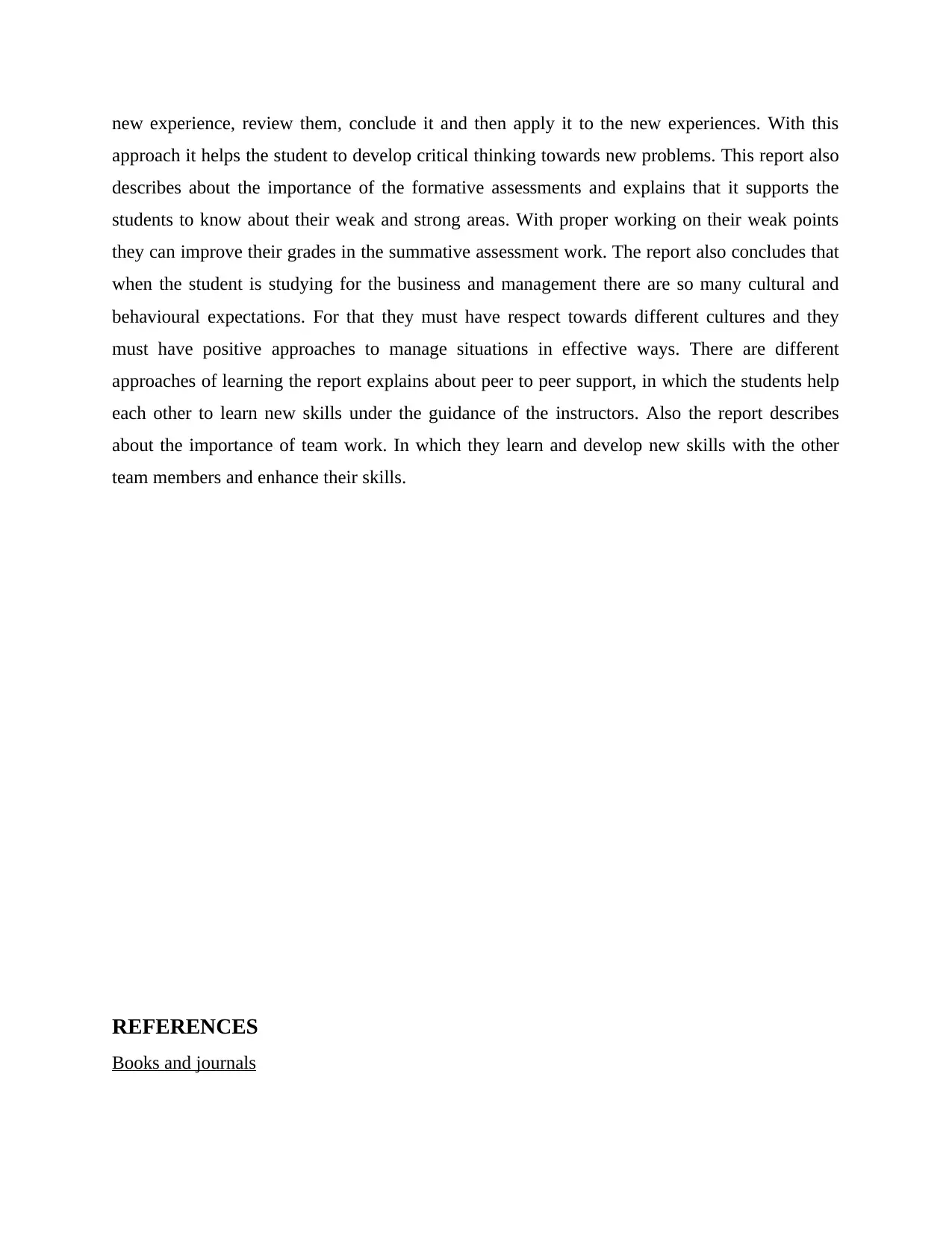
new experience, review them, conclude it and then apply it to the new experiences. With this
approach it helps the student to develop critical thinking towards new problems. This report also
describes about the importance of the formative assessments and explains that it supports the
students to know about their weak and strong areas. With proper working on their weak points
they can improve their grades in the summative assessment work. The report also concludes that
when the student is studying for the business and management there are so many cultural and
behavioural expectations. For that they must have respect towards different cultures and they
must have positive approaches to manage situations in effective ways. There are different
approaches of learning the report explains about peer to peer support, in which the students help
each other to learn new skills under the guidance of the instructors. Also the report describes
about the importance of team work. In which they learn and develop new skills with the other
team members and enhance their skills.
REFERENCES
Books and journals
approach it helps the student to develop critical thinking towards new problems. This report also
describes about the importance of the formative assessments and explains that it supports the
students to know about their weak and strong areas. With proper working on their weak points
they can improve their grades in the summative assessment work. The report also concludes that
when the student is studying for the business and management there are so many cultural and
behavioural expectations. For that they must have respect towards different cultures and they
must have positive approaches to manage situations in effective ways. There are different
approaches of learning the report explains about peer to peer support, in which the students help
each other to learn new skills under the guidance of the instructors. Also the report describes
about the importance of team work. In which they learn and develop new skills with the other
team members and enhance their skills.
REFERENCES
Books and journals
Paraphrase This Document
Need a fresh take? Get an instant paraphrase of this document with our AI Paraphraser
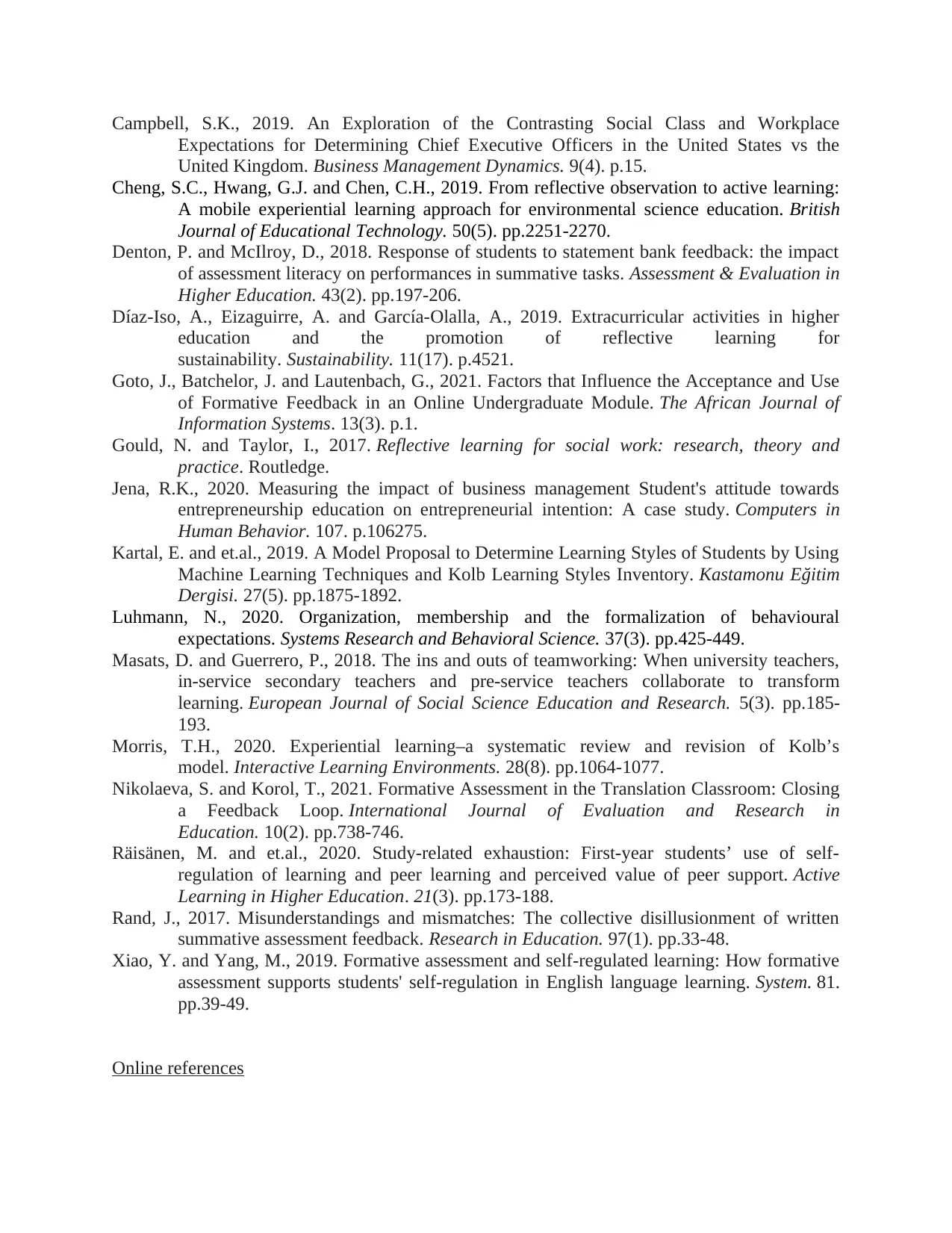
Campbell, S.K., 2019. An Exploration of the Contrasting Social Class and Workplace
Expectations for Determining Chief Executive Officers in the United States vs the
United Kingdom. Business Management Dynamics. 9(4). p.15.
Cheng, S.C., Hwang, G.J. and Chen, C.H., 2019. From reflective observation to active learning:
A mobile experiential learning approach for environmental science education. British
Journal of Educational Technology. 50(5). pp.2251-2270.
Denton, P. and McIlroy, D., 2018. Response of students to statement bank feedback: the impact
of assessment literacy on performances in summative tasks. Assessment & Evaluation in
Higher Education. 43(2). pp.197-206.
Díaz-Iso, A., Eizaguirre, A. and García-Olalla, A., 2019. Extracurricular activities in higher
education and the promotion of reflective learning for
sustainability. Sustainability. 11(17). p.4521.
Goto, J., Batchelor, J. and Lautenbach, G., 2021. Factors that Influence the Acceptance and Use
of Formative Feedback in an Online Undergraduate Module. The African Journal of
Information Systems. 13(3). p.1.
Gould, N. and Taylor, I., 2017. Reflective learning for social work: research, theory and
practice. Routledge.
Jena, R.K., 2020. Measuring the impact of business management Student's attitude towards
entrepreneurship education on entrepreneurial intention: A case study. Computers in
Human Behavior. 107. p.106275.
Kartal, E. and et.al., 2019. A Model Proposal to Determine Learning Styles of Students by Using
Machine Learning Techniques and Kolb Learning Styles Inventory. Kastamonu Eğitim
Dergisi. 27(5). pp.1875-1892.
Luhmann, N., 2020. Organization, membership and the formalization of behavioural
expectations. Systems Research and Behavioral Science. 37(3). pp.425-449.
Masats, D. and Guerrero, P., 2018. The ins and outs of teamworking: When university teachers,
in-service secondary teachers and pre-service teachers collaborate to transform
learning. European Journal of Social Science Education and Research. 5(3). pp.185-
193.
Morris, T.H., 2020. Experiential learning–a systematic review and revision of Kolb’s
model. Interactive Learning Environments. 28(8). pp.1064-1077.
Nikolaeva, S. and Korol, T., 2021. Formative Assessment in the Translation Classroom: Closing
a Feedback Loop. International Journal of Evaluation and Research in
Education. 10(2). pp.738-746.
Räisänen, M. and et.al., 2020. Study-related exhaustion: First-year students’ use of self-
regulation of learning and peer learning and perceived value of peer support. Active
Learning in Higher Education. 21(3). pp.173-188.
Rand, J., 2017. Misunderstandings and mismatches: The collective disillusionment of written
summative assessment feedback. Research in Education. 97(1). pp.33-48.
Xiao, Y. and Yang, M., 2019. Formative assessment and self-regulated learning: How formative
assessment supports students' self-regulation in English language learning. System. 81.
pp.39-49.
Online references
Expectations for Determining Chief Executive Officers in the United States vs the
United Kingdom. Business Management Dynamics. 9(4). p.15.
Cheng, S.C., Hwang, G.J. and Chen, C.H., 2019. From reflective observation to active learning:
A mobile experiential learning approach for environmental science education. British
Journal of Educational Technology. 50(5). pp.2251-2270.
Denton, P. and McIlroy, D., 2018. Response of students to statement bank feedback: the impact
of assessment literacy on performances in summative tasks. Assessment & Evaluation in
Higher Education. 43(2). pp.197-206.
Díaz-Iso, A., Eizaguirre, A. and García-Olalla, A., 2019. Extracurricular activities in higher
education and the promotion of reflective learning for
sustainability. Sustainability. 11(17). p.4521.
Goto, J., Batchelor, J. and Lautenbach, G., 2021. Factors that Influence the Acceptance and Use
of Formative Feedback in an Online Undergraduate Module. The African Journal of
Information Systems. 13(3). p.1.
Gould, N. and Taylor, I., 2017. Reflective learning for social work: research, theory and
practice. Routledge.
Jena, R.K., 2020. Measuring the impact of business management Student's attitude towards
entrepreneurship education on entrepreneurial intention: A case study. Computers in
Human Behavior. 107. p.106275.
Kartal, E. and et.al., 2019. A Model Proposal to Determine Learning Styles of Students by Using
Machine Learning Techniques and Kolb Learning Styles Inventory. Kastamonu Eğitim
Dergisi. 27(5). pp.1875-1892.
Luhmann, N., 2020. Organization, membership and the formalization of behavioural
expectations. Systems Research and Behavioral Science. 37(3). pp.425-449.
Masats, D. and Guerrero, P., 2018. The ins and outs of teamworking: When university teachers,
in-service secondary teachers and pre-service teachers collaborate to transform
learning. European Journal of Social Science Education and Research. 5(3). pp.185-
193.
Morris, T.H., 2020. Experiential learning–a systematic review and revision of Kolb’s
model. Interactive Learning Environments. 28(8). pp.1064-1077.
Nikolaeva, S. and Korol, T., 2021. Formative Assessment in the Translation Classroom: Closing
a Feedback Loop. International Journal of Evaluation and Research in
Education. 10(2). pp.738-746.
Räisänen, M. and et.al., 2020. Study-related exhaustion: First-year students’ use of self-
regulation of learning and peer learning and perceived value of peer support. Active
Learning in Higher Education. 21(3). pp.173-188.
Rand, J., 2017. Misunderstandings and mismatches: The collective disillusionment of written
summative assessment feedback. Research in Education. 97(1). pp.33-48.
Xiao, Y. and Yang, M., 2019. Formative assessment and self-regulated learning: How formative
assessment supports students' self-regulation in English language learning. System. 81.
pp.39-49.
Online references
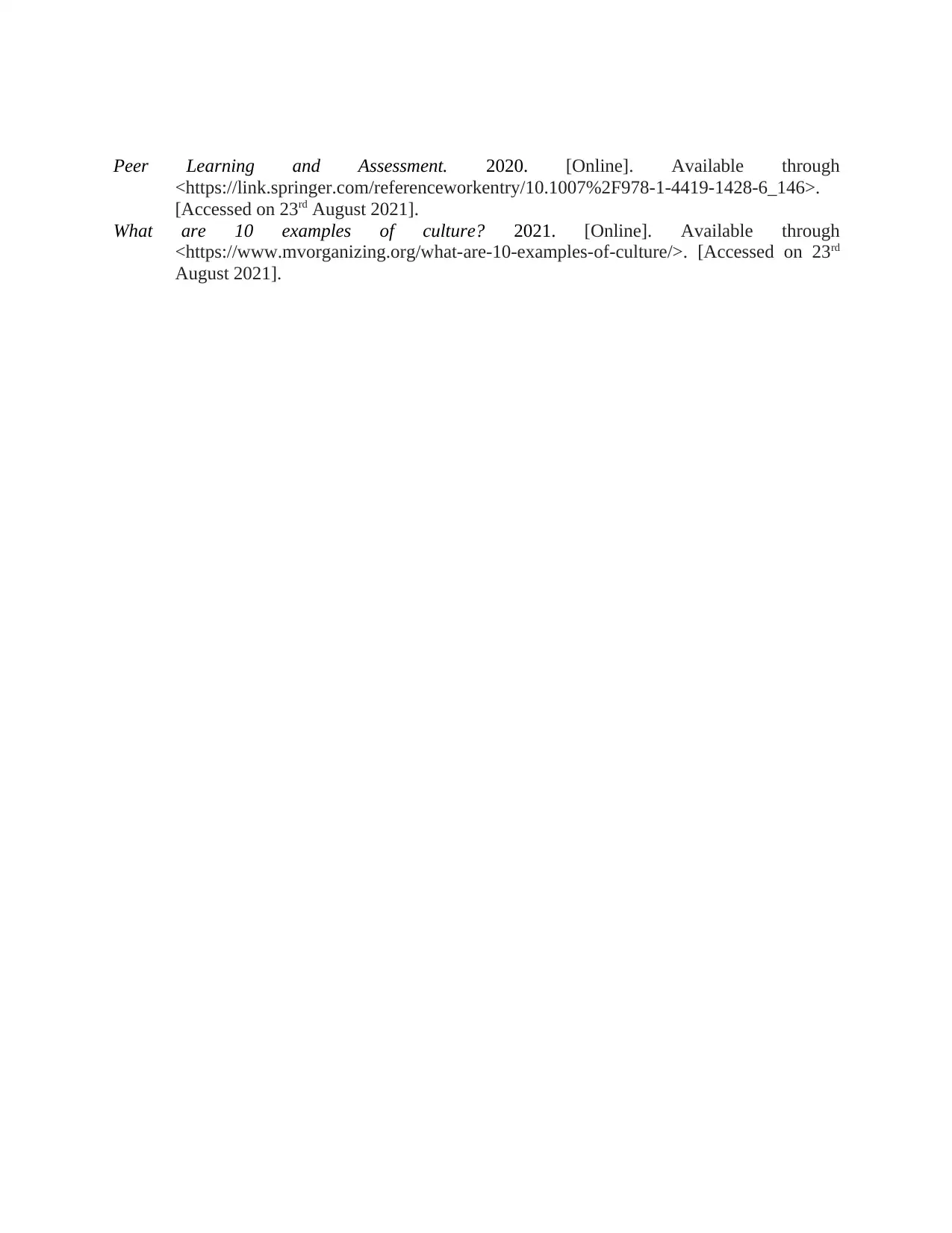
Peer Learning and Assessment. 2020. [Online]. Available through
<https://link.springer.com/referenceworkentry/10.1007%2F978-1-4419-1428-6_146>.
[Accessed on 23rd August 2021].
What are 10 examples of culture? 2021. [Online]. Available through
<https://www.mvorganizing.org/what-are-10-examples-of-culture/>. [Accessed on 23rd
August 2021].
<https://link.springer.com/referenceworkentry/10.1007%2F978-1-4419-1428-6_146>.
[Accessed on 23rd August 2021].
What are 10 examples of culture? 2021. [Online]. Available through
<https://www.mvorganizing.org/what-are-10-examples-of-culture/>. [Accessed on 23rd
August 2021].
⊘ This is a preview!⊘
Do you want full access?
Subscribe today to unlock all pages.

Trusted by 1+ million students worldwide
1 out of 9
Related Documents
Your All-in-One AI-Powered Toolkit for Academic Success.
+13062052269
info@desklib.com
Available 24*7 on WhatsApp / Email
![[object Object]](/_next/static/media/star-bottom.7253800d.svg)
Unlock your academic potential
Copyright © 2020–2026 A2Z Services. All Rights Reserved. Developed and managed by ZUCOL.



